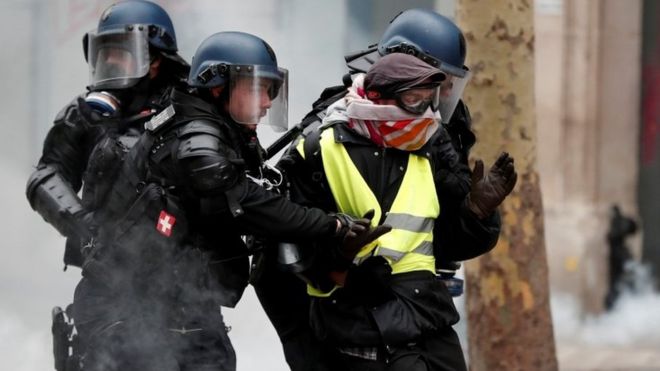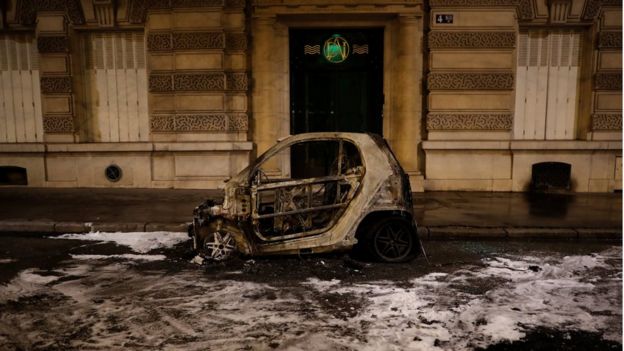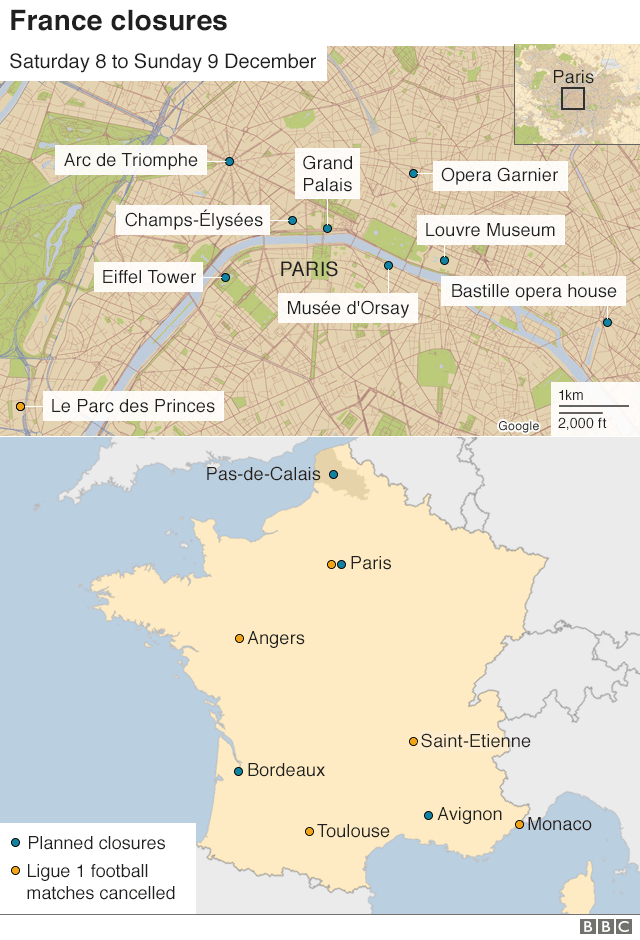 |
| Many more people were detained on 8 December than during the previous weekends |
French Prime Minister Édouard Philippe has vowed to "restore national unity" after violence broke out during a fourth consecutive weekend of protests.
Police used tear gas and rubber bullets on Saturday - the latest day of "yellow vest" demonstrations against fuel tax rises and high living costs.
More than 1,700 people were arrested, but the violence was not on the same level as a week earlier.
Discussions with peaceful protesters "must continue", Mr Philippe said.
He added: "No tax should jeopardise our national unity. We must now rebuild that national unity through dialogue, through work, and by coming together."
He said President Emmanuel Macron - who many protesters want to stand down - would soon "put forward measures to foster this dialogue".
French Interior Minister Christophe Castaner praised police - who had been deployed in force - for containing much of the unrest.
In a tweet late on Saturday, Mr Macron thanked the security forces for their "courage and exceptional professionalism".
What happened on Saturday?
An estimated 125,000 people took part in marches across the country on Saturday, the interior ministry said.
Nearly 90,000 officers had been deployed, including 8,000 in Paris where 12 armoured vehicles were also used.
Around 10,000 people demonstrated in the capital, where the scenes were the most destructive. Windows were smashed, cars were burned and shops were looted.

Video footage showed protesters hit by rubber bullets - including in the face. At least three members of the press were among those hit.
Seventeen police officers were also hurt, Mr Castaner said.
Protest timeline
- 17 November: 282,000 protesters - one dead, 409 wounded - 73 in custody
- 24 November: 166,000 protesters - 84 wounded - 307 in custody
- 1 December: 136,000 protesters - 263 wounded - 630 in custody
- 8 December : 125,000 protesters - 118 wounded - 1,723 arrested

What next for Macron?
By Hugh Schofield, BBC News, Paris
The French government is relieved that its worst forebodings about the protests did not come to pass.
There was certainly some violence in Paris, but it was not on the scale of the week before.
The new tactics of the police - record numbers of officers deployed, moving quickly to occupy the ground and not hesitating to make arrests - paid off. Interior Minister Christophe Castaner said the escalation of violence had been stopped.
It is a relief for President Macron - but not much more. He must know that the moment will be thrown away if he does not move in quickly now with ideas that go some way to satisfying the more moderate of the yellow vests.
The time is for dialogue, the government says, and the president will make an address to the nation early this week.
The question is will he give the protesters what they want, which is something very simple: more money in their pockets. Does he think France can afford to economically?


 Where are we with the yellow vest movement?
Where are we with the yellow vest movement?
The "gilets jaunes" protesters are so-called because they have taken to the streets wearing the high-visibility yellow clothing that is required to be carried in every vehicle by French law.
Over the past few weeks, the social media movement has morphed from a protest over fuel prices to a leaderless spectrum of interest groups and differing demands.
Its core aim, to highlight the economic frustration and political distrust of poorer working families, still has widespread support.
An opinion poll on Friday showed a dip in support for the protests, but it still stood at 66%.
Meanwhile, President Macron's ratings have fallen to 23% amid the crisis, polls suggest.
What has the government conceded?
The government has said it is scrapping the unpopular fuel tax increases in its budget and has frozen electricity and gas prices for 2019.
The problem is that protests have erupted over other issues.
Granting concessions in some areas may not placate all the protesters, some of whom are calling for higher wages, lower taxes, better pensions, easier university requirements and even the resignation of the president.
Some of Mr Macron's critics call him "the president of the rich".
Source: BBCNews

No comments:
Post a Comment
Add a Comment...